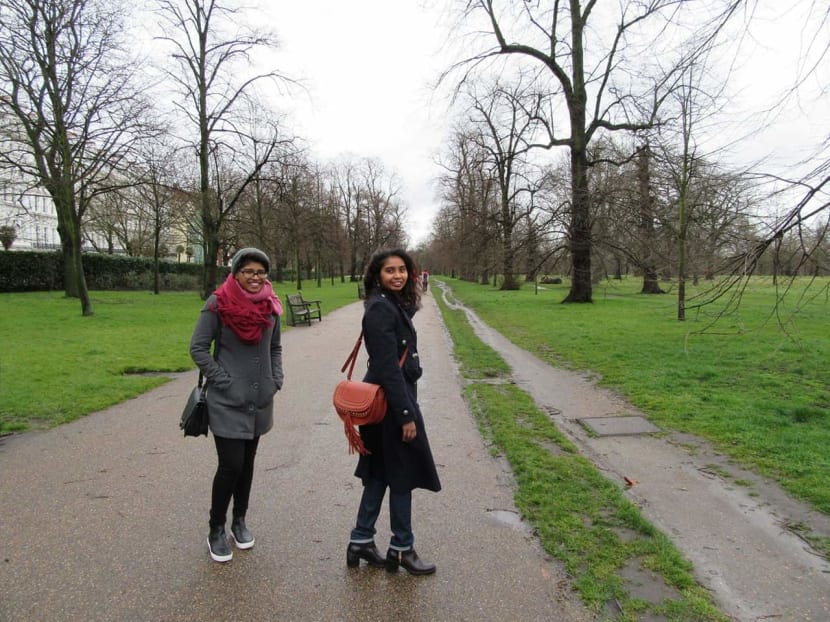Gen Y Speaks: Am I a millennial or not?

The author (right), seen here with her 21-year-old sister during a holiday in London, says that her friends define millennial in their own different ways.
“I was shook when I saw Brenda at Zouk last week. She was slaying, oh my god.”
That’s how a colleague just four years younger than me described her weekend to me the other day. But I couldn’t understand the words coming out of her mouth.
What’s “shook” and “slaying”? Turns out that’s how millennials describe an unbelievable feeling and someone succeeding at something, respectively.
As I sat through the conversation listening to other strange terms being thrown about casually by my 25-year-old colleague, I began to wonder if I am “millennial” enough.
Do I fit the bill of being a millennial or am I just one in age alone?
And this was how I ended up asking friends in their 20s what it means to be a millennial.
For starters, everyone agreed that age is the first defining criterion. But no one could tell me precisely what the age range is, with most people pitching it at “20s to 30s”.
Even Google couldn’t give a clear answer. A quick search threw up different definitions online. Historians Neil Howe and William Strauss, who are credited with coining the term
“millennial”, define it as someone born from 1982 to 2004.
Nielsen Media Research on the other hand, sets the starting point much earlier at 1977, running all the way till 1995. Pew Research Centre takes anyone born between 1981 and 1996 as a millennial.
The differing age ranges aside, at 29, I definitely clear the first hurdle to qualifying as a millennial by falling squarely within its age range.
So what am I still missing?
The next step, it seems, is that I have to be plugged in to the latest in communication and social media channels. By that, we are not talking about WhatsApp or Facebook.
I have to be on Telegram, Twitter, keep up with the memes and consume my news only online. Then there’s Instagram.
Sure, I have posted my fair share of food pictures on my Instagram account. But the rest of the millennial world has moved on to Instastory. Likewise, while I am still trying to experiment with the “Sticker” function on Telegram, my friends are already using the poll and game functions.
No wonder I am not in tune with millennial lingo.
Desperate to find other characteristics of millennials to validate myself as one, I probed my friends further.
“A liberal outlook,” said one friend. “Our generation is more ‘woke’ (another millennial term meaning to be involved). We’ve lived through what is possibly the most multi-cultural and diverse of times.”
“A desire for work-life balance,” said another. “We want a career, but not at the expense of our social lives.” Millennials, he added, also expect their workplace to be “dynamic”, with no strict 9-to-5 hours. Most importantly, millennials need to find fulfilment in their work.
Now we are starting to get somewhere, I thought. These are millennial characteristics that I feel more in tune with.
While I am not the most open-minded person, I do consider myself to be politically liberal. I cheered when the #MeToo movement gave women more courage to speak up, and I followed with great interest the Black Lives Matter movement and considered its implications for minority inclusion in my own society.
I have also made a very “millennial” move by leaving a desk job to take up my current role as a reporter in the hope of gaining greater personal satisfaction.
But eventually, I realised that there was no real consensus on what it means to be a millennial.
This dawned on me when a friend said that the most millennial person she knows is another in our group — X — who actively pursues her passions while holding down a job that appears to give her a sense of purpose.
Yet X denies that she is a millennial, pointing to the fact that she feels a little too old to be keeping up with social media trends — “why in the world does food need to look better than it tastes?” — and distances herself from the negative connotations that come with being a millennial such as job-hopping and “being soft”.
Even my 21-year-old sister whom I feel ticks all of the “millennial” criteria mentioned above, was unsure if she was one.
“My friends and I are at that ‘in-between’ age,” said my sister.
“We identify with pop culture from the 90s and early 2000s the way millennials do, but we were so young at that time that I’m not sure if we merely relate to that timeframe out of nostalgia.”
However, she added that she felt too old to be part of Generation Z — the generation after millennials born in the late 1990s.
She also debunked the notion that I was any less of a millennial for not keeping up with popular culture trends, pointing out that she herself was unable to relate to the media that Generation Z consumed.
It seems that ultimately, the people around me are all defining “millennial” in our own ways.
Sure, my millennial friends have a general sense of the characteristics that they are associated with. Yet, when it comes down to the actual definitions, there is less certainty.
It also seems that my friends chose to identify with the characteristics that they want to, and distance themselves from aspects that they relate less with.
It dawned on me then, that it was perfectly alright to not subscribe to every millennial stereotype in the book, so long as I was clear on the characteristics that I identified with.
So perhaps I’m a millennial after all — and it’s whatever I want it to be.
ABOUT THE AUTHOR:
Navene Elangovan is a senior reporter at TODAY covering the arts and the environment beats.






